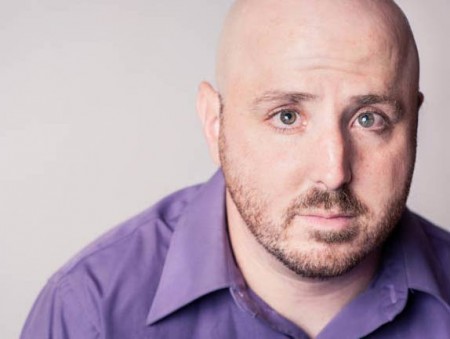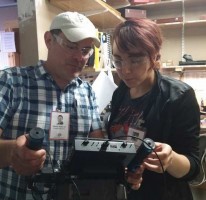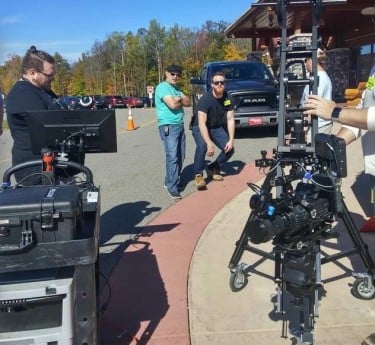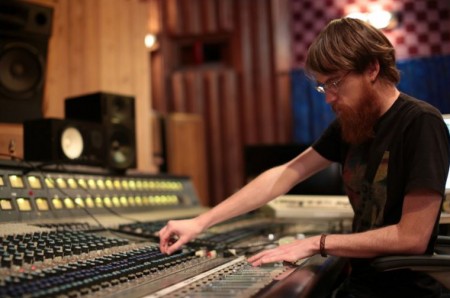To be successful as an on-air radio host, personality is key—and unlike television or stage, you have to evoke that personality based on voice alone. Few people understand this better than Radio Connection student Ryan McChesney, who enrolled in the program with a dream of developing his on-air chops and hopefully producing his own show. Coming from a background of theatre, improv and stand-up comedy, he already knew a thing or two about having a public persona, but as you’ll see below, apprenticing at the Radio Connection has given him a fresh respect for how that personality needs to come through over the microphone.
Ryan currently apprentices with radio personality Steve Serrano at Mix 93.3-FM in Kansas City, MO. In the conversation below, he chats with us about how he made the move from stand-up into radio and what he’s learning in the process. Enjoy!
* * * * *

Radio Connection student Ryan McChesney
Well, I’ve always enjoyed radio. I don’t know if it was a transition, but just what I liked about radio is I used to do improv in Chicago, improv comedy. Our improv group…started our own online radio show. Essentially, every week we’d write, produce our own radio show and it would be really great. It would be a lot of fun experience. We did comedy bits, we did talking bits, we had our friends come in and perform music and I thought, “This is really cool.” We got to a lot of people, we could still be creative…that was probably the time when I thought, “I probably want to do more of this.”
RRFC: So coming from the background of stand-up comedy, just being able to use your voice to get a reaction out of an audience, how does that lend itself to radio?
Ryan: The personality, you have to be entertaining and witty. Probably, I would say the most important thing that I learned from stand-up, and also mostly learning in radio, is that there has to be a likability there. There has to be kind of a charm and a likability…you can have, in stand-up, the best shows in the world, but if people don’t like you and you have this kind of standoffish or put-offish persona, you’re not going to be successful. That’s probably the most important thing that I learned with other comedians.
RRFC: What steps did you start taking to sort of educate yourself in the world of radio, and how did you end up at the Radio Connection?
Ryan: Doing our online show, I kind of got the feel of how everything worked. It’s like I had to move back to Kansas City, where I was originally from, because of health reasons and family reasons, and then everything kind of hit the fan for me, and then I realized that I need to make a change… I wanted to do something within the radio industry, and that’s when I started to do research on different programs and that’s when I fell into the Radio Connection. That’s when I saw you guys.
RRFC: People often wonder how we have locations in so many cities, not realizing that we’re actually training them in real radio facilities in their area. Did it surprise you that you could get an education in radio in your hometown, or at least not have to drive so far?
Ryan: Yeah…I don’t know if I was skeptical, but I was like, “How is this gonna work?” It did surprise me, but I also enjoyed that though. It’s been cool.
RRFC: Tell us about meeting your mentor for the first time and what it was like walking into the radio station.
Ryan: I’d never been to Mix [before], but meeting Steve, he was a really cool guy and seemed really laid back, really chill, and I liked him…Then the more I got to hang out with him, he’s very funny, and he’s really good at what he does on the air to the point where it’s just like you almost forget that…because he’s been doing it so long that you’re like, Okay, this is the baby steps that you have to take…I respect how good he is at what he does.
RRFC: Cool. All in all, what makes him a great mentor to learn from?
Ryan: His feedback is good. For instance, I did a commercial a few weeks ago, produced a commercial…He listened to it and immediately gave me really good feedback about it, like, “What would make this better would be if you cut the music here and put a new one” or “Your voice needed to be the same tone throughout,” and just giving me direction on that…That’s what he really excels at.
RRFC: What has your apprenticeship taught you as far as improving on what you do?
Ryan: Well…I came from the theater background. [At first] I really tried to overdo it as far as acting with my voice, and just sounded so cheesy. It sounded so bad, and so [Steve’s] direction was, “Yeah, don’t ever do it like that again,” and I was like, “I won’t” [laughs]. I started doing it more like my own [voice]. For instance…we were doing a Chief’s commercial for Rally House here in Kansas City, and I read…at first I kind of read it, — what they gave me, rewrote it — and then read it. It was kind of okay, but then they told me to add my own personality to it. That’s when I started to kind of…I felt like it set me apart, you know? That’s when I felt like, okay, this is good. It was entertaining, it was energetic, and that was probably a breakthrough for me when I got to add my own little personality and just have fun with it.
RRFC: Now that you’ve worked in both areas, radio and podcasting, how has it sort of changed your opinion or respect for radio?
Ryan: It’s not as easy as it looks. It looks like it’s fun, but you’re on a time crunch, and you have to hit certain spots…It’s a discipline and you have to keep working on it to get good, but yeah, it is very…there’s a newfound respect there.
RRFC: What kind of show would you like to ultimately produce for yourself if someone gave you full range?
Ryan: That’s a great question. I feel like I would want to do…like a talk show, almost like a Howard Stern-ish kind of like comedy, but also interviews and whatnot.
RRFC: Do you think that some of the more successful kind of shock jocks or whatever that can talk about essentially nonsense for three or four hours, do you think they do that by essentially playing a caricature of themselves?
Ryan: Yeah, and that’s kind of what we discussed, too, with Steve. You have to find your voice, and it is about finding your voice and it is about playing your character but dialed up a notch. It goes with improv, too. It’s like playing Ryan, but also there’s this weird persona that I have…just this weirdness, but entertaining factor about it you have to develop and just kind of go with it, go with your persona and play the character, and know that you’re also there for entertainment.
RRFC: Where you want to see yourself down the road in a little bit in radio?
Ryan: Doing my own show with my friend, Gabe. We did podcasting and improv together in Chicago. I would like to do a show with him, produce a show with him.
* * * * *

 Jocelyne Berumen (Green Bay, WI) has been on a number of commercial shoots recently. Here, her mentor Jimmy Degroot is showing her how he wants her to grab BTS footage. During a recent shoot for commercial client Ho-Chunk, Jocelyne was reminded of how the unexpected is always a possibility while filming:
Jocelyne Berumen (Green Bay, WI) has been on a number of commercial shoots recently. Here, her mentor Jimmy Degroot is showing her how he wants her to grab BTS footage. During a recent shoot for commercial client Ho-Chunk, Jocelyne was reminded of how the unexpected is always a possibility while filming:





